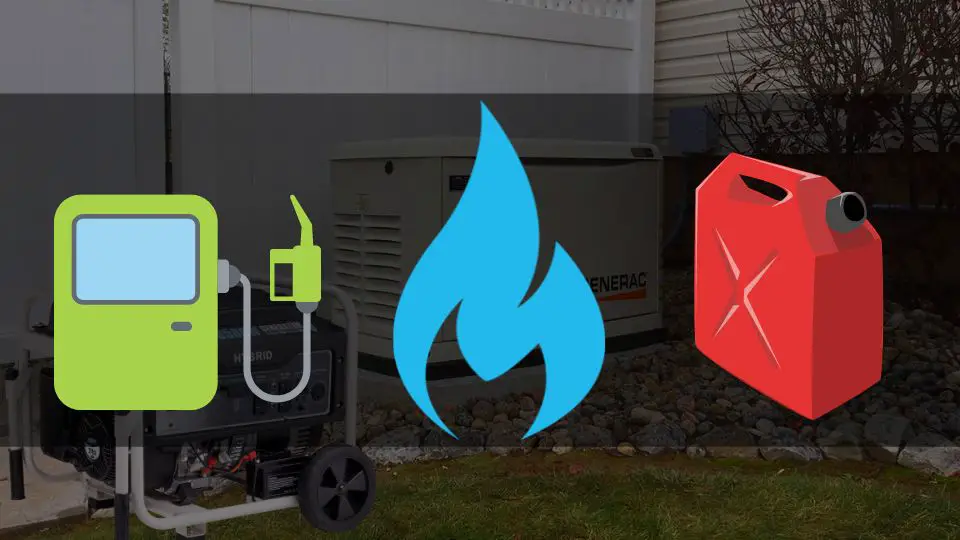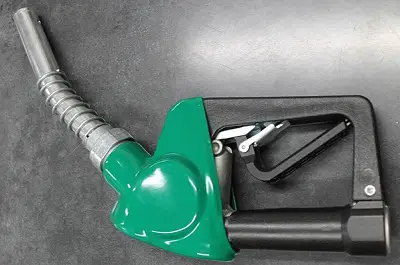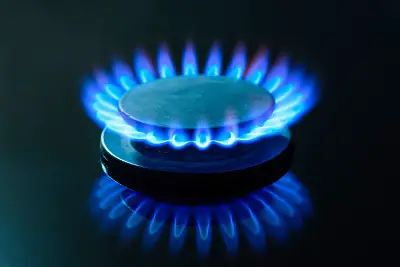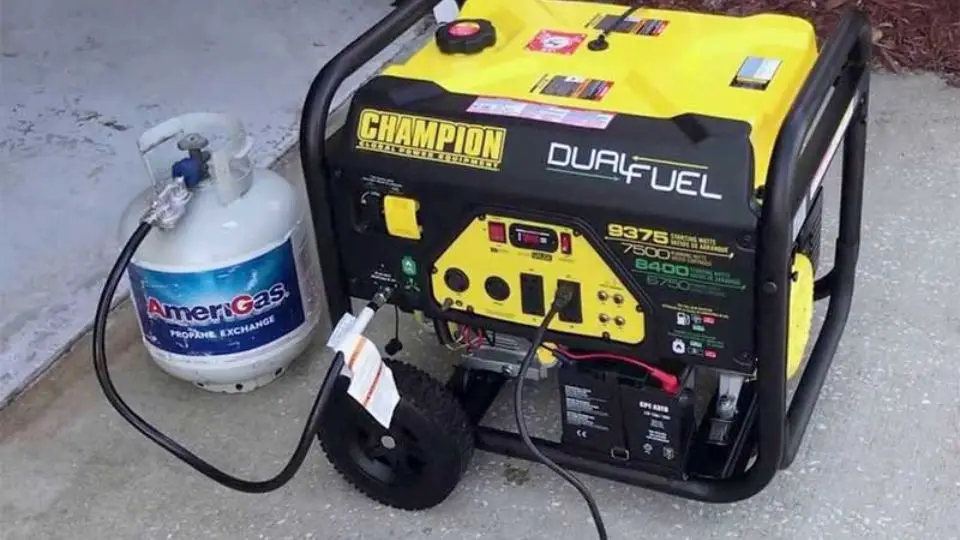This post may contain affiliate links. As an affiliate, we earn from qualifying purchases. We get commissions for purchases made through links in this post.
Choosing the right fuel for a home backup generator can be a tricky task. Factors such as how often, how long, and at what load the generator is running must be considered to ensure optimal performance.
For a long time, diesel generators were thought to be the most efficient option due to their high energy content by volume compared to other fuels. However, as technology has advanced, other factors must now be taken into account when selecting the most efficient fuel for a generator.
The cost of the fuel as well as the fuel’s accessibility in your area should be taken into account when choosing the most effective fuel for a home backup generator. For instance, natural gas or gasoline is normally cheaper, but diesel fuel may be more widely available in some areas.
Ultimately, the most efficient fuel for a home backup generator will depend on the specific needs and circumstances of the homeowner. It’s important to consider all factors, including cost, availability, emissions, and maintenance requirements, before making a decision.
It is also worth mentioning that diesel or natural gas generators are usually those big units that you use for home backup power. If you want to use a portable generator, you will hardly find one that runs on diesel. You will also not usually run a portable generator on natural gas.
In this article, we will examine the various factors that influence the choice of generator fuel. While diesel generators have a proven track record of efficiency when compared to gas or propane generators, it is also possible for whole-house generators running on natural gas to be just as efficient as diesel generators, depending on other conditions.
What fuel is the most efficient for a generator?
Diesel is still considered the most efficient fuel for a generator. This is due to the much higher energy density of diesel fuel compared to gasoline or even natural gas.
Just take a look at this. Diesel has 137,381 BTU per gallon. Now, compare this to a gas (or gasoline) that has only 120,238 BTU. Things are even worse with propane which has just 91,500 BTUs. As for natural gas, it has the smallest BTUs per gallon, which is just 69,613. Note: propane and NG are actually measured in cubic feet instead of gallons, but we are using converted values for easier comparison.
Diesel fuel
Diesel generators use compression to ignite the fuel. This, along with much higher combustion energy makes diesel the most efficient fuel for a generator. A diesel generator typically operates at roughly 40% efficiency throughout its intended optimum working range, which is often up to 80% of the total load capacity. In other words, 40 units of energy are supplied as output for every 100 units of energy received. There are energy losses from heat and friction in every mechanical system.
Diesel generators are renowned for their efficiency, and the reason why is simple. Because compression is used to ignite the fuel, a diesel generator uses less fuel than a generator powered by natural gas. Diesel generators separately inject and compress fuel and air into the engine, which allows them to generate power while using less fuel.
Having said that, things are not that simple. Diesel generators are great for home backup power as long as you run them at 50 to 70% load. The maximum recommended load for a continuous run is 80%. If you operate a diesel generator at less than 50% of its capacity for extended periods of time, it will experience wet stacking, which causes unburned fuel and soot to enter the exhaust system.
In order to prevent that, you are going to need to use load banks to make the generator run at an excessive performance. Doing this will avoid residue to accumulate in cylinders and exhaust. You can also pay a company to perform regular maintenance of your diesel generator by running it in a load of 80%. If you don’t do that, your diesel generator will have its efficiency reduced in time. But that’s not the main issue. A generator that’s being consistently run in a wet stacking condition will have its lifespan reduced considerably.
One other significant drawback of diesel generators compared to one that runs on natural gas or gasoline is it costs significantly more. Of course, less maintenance compared to an NG generator will be more beneficial in the long run.
Natural gas
With that in mind, let’s have a look at another fuel-efficient type of generator that you can use for your entire house. Natural gas generators are becoming more and more popular, especially in those regions with good pipeline infrastructure. Natural gas-powered generators, which burn hotter than diesel engines, may be a better option. Even when operated at a lighter-than-optimal load, these engines are less likely to encounter issues with unburned fuel.
Manufacturers of spark-ignited natural gas engines can now adjust the RPM of these engines to mimic the transient responsiveness of diesel. Additionally, manufacturers are creating natural gas units that can start up in less than 10 seconds, which is a need for backup systems that are normally connected to diesel engines.
Today, the distinctions between diesel and natural gas generators are less clear due to the advancement of new technology in engines, enclosures, and other components.
Gas (or gasoline)
More traditional fuel for portable generators (although they can be converted to use propane). Gas generators offer a great balance between diesel and NG-powered generators when you don’t need to power your household electrics for a prolonged period of time.
Gas generators are generally more efficient than natural gas ones and quieter than diesel generators. The efficiency of gas engines is of course considerably lower than their diesel counterparts, but, they are still ahead of natural gas ones. They are also cheaper, lighter, and smaller than diesel generators.
One of the benefits of using gas as a fuel for a generator is that it is readily available and easy to find. Additionally, gasoline is relatively inexpensive compared to other fuels. However, there are also some drawbacks to using gas as a fuel. The main disadvantage compared to diesel or natural gas, is that gasoline has twice as short a degradation timespan in contrast to diesel, while natural gas can be stored for an indefinite period of time. This can of course be fixed by using fuel additives to gasoline, but, this will incur more spending.
When deciding whether to use gasoline as a fuel for a generator, it’s important to consider the specific needs of the application. If the generator will be used in a remote or hard-to-reach location, gasoline’s availability and ease of transport may make it a more practical choice. Additionally, if cost is a major factor, gasoline may be a more affordable option. However, if long-term efficiency and environmental impact are a major concern, natural gas may be a better option.
The most efficient fuel
In general, diesel fuel has a peak energy density that is about three times more than that of natural gas (129 against 37 BTU). As a result, diesel generators still outperform natural gas generators in terms of efficiency.
However, there are other factors to take into account when choosing a generator in addition to fuel efficiency. Certain advantages of a natural gas generator, such as their propensity to be quieter and more environmentally friendly, maybe appealing depending on your application and power requirements.
Choosing the most efficient fuel for a generator depends on many factors. It greatly depends on the specific needs of the application, such as location, cost, and environmental impact. The rule of thumb here would be – if you plan on running your generator constantly as a whole-house backup solution for many hours, you must either choose a diesel or natural gas as its fuel. In case you have a natural gas line already available in your area it will make more sense to purchase a natural gas generator and connect it to an NG pipeline. Otherwise, using a diesel generator is a more reasonable option.
If you’re going to use your generator only from time to time and most importantly, if your generator is a portable one, you really should go with gas as its fuel and make sure you don’t store gas for too long (more than 6 months) as it degrades 2 times faster than diesel. If you want to have a piece of mind and make sure your portable generator is always ready to use, but you are not sure when you want to use it, the best is to get a dual-fuel generator that can run on gas and propane. The latter can be stored indefinitely, though it is less energy efficient than gas.
What is the cheapest fuel for a generator?
Natural gas is the cheapest fuel for a generator. Then comes propane, which is also very cheap. Then comes gasoline which is more expensive than both propane and NG but is still cheaper than diesel. And last comes diesel fuel, which has the highest price per gallon.
Having said that, running a diesel generator will almost always be the more cost-efficient as diesel fuel has the highest energy density. In other words, you will burn less diesel to generate the same amount of electricity when compared to other types of fuel. Another consideration would be the fact that the price of natural gas is very stable from year to year, while petroleum fuel prices fluctuate quite significantly.
If you plan to install a whole-house generator and you have an NG line in your house, it is probably the best bet to go for natural gas generators (like Generac offers) as this will be the cheapest option even when compared to diesel. Plus, you won’t need to deliver diesel fuel constantly and the cost of an NG whole-house generator is significantly lower than a diesel one.
What gasoline is used for generators?
Most types of generators use regular unleaded fuel. The same kind of gasoline that is used in cars and other vehicles may be utilized in generators.
It is best to use fresh fuel as much as possible because gasoline that has been sitting for a long period can degrade and lead to issues with the generator. To keep the gasoline from spoiling while being stored for a longer period (more than 3 months) you’re going to need to use fuel additives.
It is usually advised to consult the generator’s manual to see what the manufacturer suggests for fuel kind and storage.
Some generators may run on premium or mid-grade fuel in addition to ordinary unleaded gasoline. It’s crucial to remember that using gasoline with a higher octane rating than the generator was made to handle might not improve performance and might even harm the engine.
The best place to look for suggestions on specific fuel types is in the owner’s manual for your generator.
Is ethanol-free gas good for a generator?
A generator can run on ethanol-free gasoline, but it’s not always essential. Gasoline that doesn’t include any ethanol is known as ethanol-free gas. Ethanol is a form of alcohol that is frequently added to gasoline as an oxygenate.
10% ethanol is present in the majority of US gasoline. Actually, the Department of Energy is urging oil providers to boost the ethanol component in their products to 15%.
Keep in mind that running generators on gasoline with ethanol may cause issues if they weren’t designed particularly for that fuel type.
It is a good idea to check the generator’s manual to see if the manufacturer has any specific recommendations regarding the use of ethanol-free gasoline.
Although not required for all generators, using ethanol-free gasoline is a matter of personal preference. However, some generator owners prefer it because they think it will increase the generator’s lifespan and prevent corrosion, despite the lack of sufficient scientific evidence to support this claim.
It is best to refer to your owner’s manual to find out the exact fuel requirements for your generator in terms of usage of ethanol-free gas.
Are diesel generators more efficient?
In general, diesel generators are thought to be more effective than gasoline generators. This is so that more of the energy contained in the fuel is transformed into meaningful work. Diesel engines have better thermal efficiency than gasoline engines.
Additionally, diesel engines burn more effectively than gasoline engines because they have a higher compression ratio. Additionally, diesel fuel has a higher energy density than gasoline, meaning that a given volume of diesel fuel can produce more energy than an equivalent volume of gasoline.
Diesel generators are also typically designed with larger engines and are geared for heavy-duty applications, such as powering massive industrial processes or providing backup power to crucial infrastructure. Diesel generators are more cost-effective than gasoline generators in these situations due to their efficiency and durability.
It’s important to remember that not every application is a good fit for diesel generators, and the choice ultimately comes down to the particular needs and specifications of the generator. For example, when running a whole-house generator, you may want to consider using natural gas models instead of diesel ones if your household has a ready-to-use natural gas line.
What are the disadvantages of a diesel generator?
Diesel generators have some disadvantages when compared to gasoline generators, including:
- Higher Initial Cost: Diesel generators tend to be more expensive than gasoline generators, due to the cost of the diesel engine and the need for more complex emissions control systems.
- Noise: Diesel generators tend to be louder than gasoline generators, which can be an issue in some situations.
- Emissions: Diesel engines produce more emissions than gasoline engines, which can be an environmental concern. Many diesel generators are now equipped with emissions control systems to reduce pollutants, but these can add to the generator’s cost and maintenance requirements.
- Fuel availability: In some areas, diesel fuel may be more difficult to find and this fuel is more expensive than gasoline.
- Maintenance: diesel generators’ maintenance cost is higher than that of their gasoline counterparts.
- Cold weather starting: Diesel generators can be harder to start in cold weather and may require additional equipment such as block heaters to help them start.
It’s important to keep in mind that diesel generators have different advantages and disadvantages, depending on the specific application, and the best choice will depend on the specific requirements and constraints of the situation.
Can a diesel generator run 24 hours a day?
Diesel generators are designed to run continuously, up to 24 hours a day, but it’s vital to remember that they still need routine maintenance and inspections to make sure they continue to function effectively and safely. This is even more important if you’re using a whole-house generator.
A diesel generator’s engine and other parts will be put under a lot of stress if it is operated continuously for seven days a week. This will accelerate the generator’s deterioration. Regular maintenance and checks are necessary to make sure the generator can run for extended periods of time. These checks should include checking the oil, coolant, and other fluids as well as making sure all systems are operating correctly.
Furthermore, it’s critical to correctly size the generator for the load it will be powering. The generator will be overworked if the size is incorrect, which can result in additional wear and tear and problems with fuel efficiency.
Having a backup generator will ensure that there will be power in the event of a malfunction.
It is always advisable to consult the owner’s manual for the generator to learn about the manufacturer’s suggestions for the running duration, routine maintenance, and warranty.
How can I make my generator more fuel-efficient?
There are several ways to improve the fuel efficiency of a generator:
- Regular maintenance: Make sure to regularly maintain your generator by keeping the air filter clean, changing the oil and oil filter, and checking the fuel filter.
- Load management: Only run the generator at the necessary capacity to meet the load demand.
- Use a more efficient fuel source: diesel or natural gas is recommended when possible.
- Use a fuel additive: Some fuel additives can improve the combustion efficiency of a generator and help it run more efficiently. This generally applies to gas generators.
- Use a variable-speed generator: A variable-speed generator can automatically adjust its speed to match the load demand, which can result in more efficient operation.
- Carbon deposits: Make sure to remove carbon deposits regularly if you’re running a diesel generator constantly at less than 70% load.
- Eco mode: Use a generator with a low-fuel-consumption mode: Some generators come with a special low-fuel-consumption mode that can help you save fuel.
- Use inverter generator: These types of generators are much more fuel-efficient and are also much quieter. They also do not produce fluctuations or surges like their conventional counterparts.
It’s important to keep in mind that the best method for increasing the fuel efficiency of a generator will depend on the specific generator you’re using, as well as the application for which it’s being used. The above suggestions are a good starting point, but you should consult the manufacturer’s manual and consult with a professional if you have any questions or concerns.








3 thoughts on “What is the most efficient fuel for a generator?”
Comments are closed.